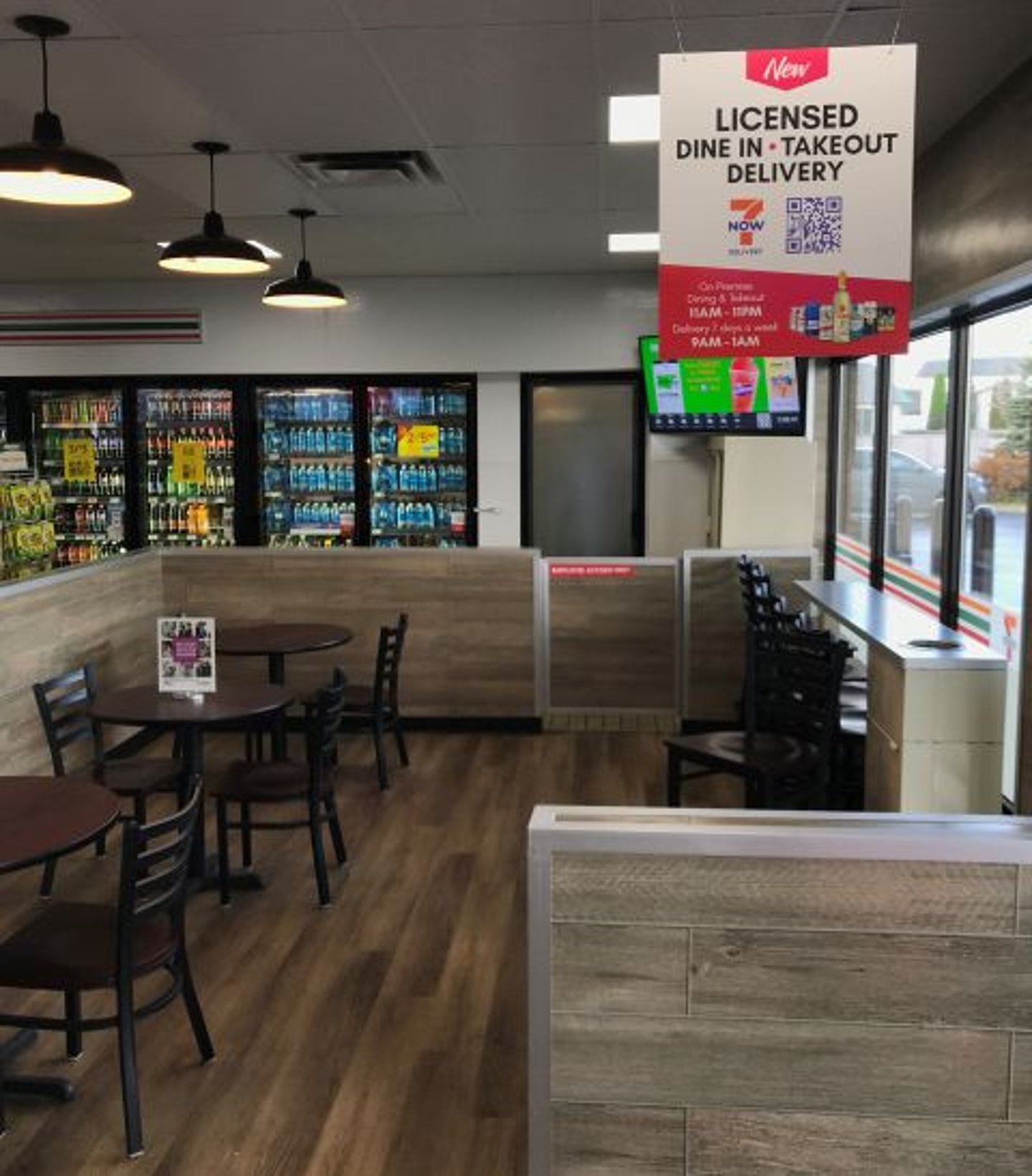Delivering change: Marc Goodman of 7-Eleven Canada
7-Eleven is a company built on innovation and changing to meet the needs of its customers. From its earliest days, debuting as an icehouse in Dallas, Texas in 1927, it expanded to 16 locations where customers also could purchase milk, eggs and bread (at the suggestion of an astute employee), eventually evolving into one of the largest retail brands in the world with some 83,000 c-store and gas locations across 19 countries.
Recent activity at 7-Eleven Canada reflects the evolution of the company, now a one-stop shop with a food-first focus, as it looks to give a new generation of Canadian consumers unique and expanded food, beverage and in-store dining options.
“There’s no doubt that over the past decade, 7-Eleven’s business has evolved. We’re much more than just a traditional convenience store,” says Marc Goodman, vice-president and general manager of 7-Eleven Canada. “A shift like this isn’t something that happens overnight; overnight; we’ve been at this for a while along with our international counterparts globally and constantly learning along the way.”
A fresh start
Goodman joined the company in 2021 as senior director of operations, before taking over the top job last summer, breaking ground as the first Canadian to lead the business here in Canada. He previously spent 23 years at Suncor where he served as head of loyalty and marketing partnerships, head of category management and head of employee experience.
As a leader, Goodman strikes the right balance—deep experience across the business, combined with a fresh approach.
“7-Eleven Canada is constantly evolving to anticipate, meet and exceed Canadians’ needs,” says Goodman, reflecting on his first year at the helm. “Since taking on this role, I’d say most of the changes that have taken place are behind the scenes, with the goal of being the first choice for convenience for our customers and the communities, while also attracting, developing, and retaining our team members.”
Meeting consumers’ needs goes beyond merely innovating a little here and there, to redefining the very core of the business.
“We’re gradually changing the customer perception that 7-Eleven is a food destination that also happens to sell convenience store items,” says Goodman, adding this is reflected in recent growth of food and beverage sales.
The future is food
A restaurant that also sells convenience items? It’s a bold statement, but 7-Eleven’s shift reflects a steady movement across convenience and gas, whereby companies—both chains and independents—are looking for ways to replace traditional (declining) revenue streams, particularly tobacco. Food and ancillary categories (beverages, both with and without alcohol) are the future.
This is happening as c-store shoppers are evolving, too. Where once having a good selection of quick grab-and-go items on hand was enough, shifting wants, needs and values have consumers expecting more, from freshly prepared meals to high-quality and locally sourced foods and beverages.
Today, 7-Eleven Canada is firmly rooted a food-first business that boasts more than 130 fresh food and beverage options, which Goodman says are prepared on-location and at the company’s food commissaries under the careful director of food and beverage category managers, as well as a resident chef.
“Canadian customers have told us they want healthy, craveable food, including organic, gluten-free, dairy-free and plant-based options,” says Goodman.
7-Eleven is delivering on these expectations and experimenting with innovative menu items. For instance, in January 2023, 7-Eleven announced a new partnership with Violife, a plant-based cheese brand and launched its first fully plant-based breakfast sandwich, made with plant-based eggs from California-based company, Just Egg, plant-based sausage from California-based Impossible Foods and Violife’s proprietary plant-based cheddar.
Around the same time, the company launched several take-out meals with vegan steak, including the Southwestern Plant-Based Steak Wrap and Mexican Plant-Based Steak Wrap. The wraps were made with Vancouver-based Wamame Foods’ plant-based Waygu strips.
Other healthier and better-for-you options include 7-Select Juice Shots, produced with Calgary-based Well. The aptly named “Antioxidant Wellness Shot” combines beet, camu-camu, lemon, orange and moringa juices.
These strategic partnerships have helped 7-Eleven Canada establish an edge in the c-store food arena. Make no mistake, however, 7-Eleven isn’t abandoning its culinary roots—the iconic Slurpee continues to be at the forefront of its offerings, as are fan favourites, such as the Crispy Classic Chicken, Big Bite hot dogs, taquitos and Canadian-made pizza, which exist alongside a refrigerated display case stocked with fresh locally made sandwiches, fruits and snacks, as well as baked goods, like cookies and croissants.
“We’re not so much growing our menu, as continually improving it to meet the flavour profile and trends that our customers are looking for, as well as introducing innovative limited time offers,” says Goodman.
Sit down and stay a while
What’s the point of having a well-rounded menu that covers all dayparts if there’s nowhere on site for customers to enjoy it? Cue the 7-Eleven Canada’s most recent evolution.
“We’re continually perfecting our menu, adding eating areas, and licensing some locations,” says Goodman, adding efforts are paying off. “Our customers have taken notice and are treating 7-Eleven locations as eating destinations to dine-in or to-go.”
After a year-long pilot program at a site in Edmonton, on December 9, 2022, 7-Eleven Canada hosted grand opening events at its seven newly licensed restaurants in Alberta to showcase its commitment to a fresh direction for the business—all feature dine-in seating areas. Of-age guests were invited to enjoy samples of 7-Eleven's Crispy Classic Chicken wings and pizza, as well as Alberta craft beers. At the same time, stores kicked off sales of chilled beer, wine, seltzers and coolers for dining in, ordering takeout or delivery (all staff who handle alcohol are ProServe trained).
Representing a first for Ontario, later that month the convenience store chain announced it had secured a liquor sales licence from the Alcohol and Gaming Commission of Ontario to serve a variety of chilled beer, wines and coolers, including local Ontario-made products, at the new dine-in area slated for its store in Leamington. In May 7-Eleven unveiled another dine-in area, this time at its store in Niagara Falls.
“We believe there’s a need to evolve and continue redefining the meaning of convenience. Innovative products and services are the lifeblood of our business. We’ve been involved in foodservice for a long time. This differentiation provides customers with yet another reason to choose 7-Eleven over others in the marketplace because it serves as a one-stop shop for them,” says Goodman. “The design of our defined eating areas is helping customers visualize 7-Eleven as a dine-in destination. By maintaining an open concept that complements the retail space with comfortable and esthetically pleasing dining areas, as well as digital signage and menu boards, music and free Wi-Fi, we are signaling to the customer that 7-Eleven Canada is a food destination to be enjoyed on- or off-premise.”
The fresh concept is poised for major growth. In Ontario, 7-Eleven has applied for liquor licenses for its more than 56 locations. And, as of press time, operators across the province are eagerly anticipating an imminent announcement from the Ford government that it's finally time for beer and wine to be sold at convenience stores.
Goodman, however, stresses that 7-Eleven’s focus remains on food: “Our strategy to be food-first is completely independent of our ability to sell and serve alcohol. Responsible alcohol service complements our restaurant business and helps drive food sales. At our licensed restaurant locations, our adult guests can enjoy a glass of beer or wine alongside their meal.”
Getting the message out
7-Eleven Canada’s marketing strategy is also undergoing an overhaul, with a greater emphasis on food and a strong focus on the valuable gen Z demographic.
READ: 7-Eleven's new ads tap into coffee's influence on gen Z culture
It’s a solid approach: Convenience Store News Canada’s 2023 C-Store IQ National Shopper Study found that 46% of gen Z and millennials shoppers make daily visits to c-stores—more than any other demographic. They’re engaged and they’re hungry.
The company and its customers now often refer to 7-Eleven as “Sev” and 7-Eleven Canada’s new ads feel fittingly fresh.
Sev’s “rizz” (TikTok slang for charisma) featured heavily in 7-Eleven Canada’s summer social media efforts with splashy, colour-saturated posts on its Facebook and Instagram pages. The pictures feature young models, influencer-inspired poses, pool floaties, bright hats and iconic 7-Eleven staples: Slurpees, chicken wings and taquitos.
“These are designed to amplify our already robust food and beverage menu for those who may think of us as a more traditional convenience store,” says Goodman. “Like all industries, you need to evolve to grow. In our convenience channel, we must continue to deliver a consistently great customer experience while also driving proprietary and unique products and services to grow the business.”
One of those services is delivery. After initially piloting delivery via third-party providers, including SkipTheDishes, DoorDash and Uber Eats, in June 2021, the company launched the 7Now delivery app in Canada. In August, the company launched a redesign of the 7Rewards loyalty program via the 7-Eleven mobile app, which introduced upgrades made to enhance the overall customer experience both in-store and via 7Now Delivery.
“Our 7Now delivery app makes it very convenient for customers to order their favourite meals and other products,” says Goodman. “We’ve put a focus on our proprietary app in recent years, and we’re seeing it produce incremental sales that positively impact our bottom line.”
Looking forward
One year into his new role, Goodman is quick to emphasize that 7-Eleven Canada’s evolution part of a big picture movement and, more importantly, a true team effort driven by people at all levels across the company and the country.
“Through the lens of the Canadian retail marketplace, we’ve been able to accelerate key strategic areas of our business,” he says, giving credit when credit is due. “Additionally, we have several merchandising and marketing team members dedicated to our food and beverage product categories to help support the business.”
The company, like others in the channel, is constantly striving to navigate external headwinds like supply chain (7-Eleven Canada worked exclusively with Wallace & Carey, which filed for creditor protection in July), inflation, regulatory and labour issues.
While the rising cost of food and regulatory challenges, including government’s approach to tobacco and vaping (which industry leaders argue fuels the contraband tobacco market, taking money out of the coffers of legitimate businesses), continue to play out, 7-Eleven is tackling labour head-on.
“Internally, we have a clear strategic focus with goals and measures to help 7-Eleven Canada excel,” says Goodman. “We continue to focus on people through career development. We want our employees to feel valued and appreciated, while putting them on a career trajectory that will benefit them and the company. We operate in the business of serving people and communities, so taking care of our people is a key part of serving…. I see success as having a team of individuals who have the tools and the desire to progress within the company.”
Fostering a workplace where creativity and innovation shape the future of the business, all with the goal of meeting and exceeding customer expectations, is core to 7-Eleven’s DNA. It goes back to 1927 when that astute employee suggested expanding the icehouse offering to include milk, eggs and bread, laying the foundation for what’s dubbed the world’s first convenience store.
“7-Eleven Canada isn’t the same as it was 10 years ago, and it won’t look the same 10 years from now,” says Goodman. “We will continue to listen to our customers as we innovate and evolve. Our traffic counts, number of loyalty members, and digital advances have been steadily increasing year over year. This is a big accomplishment, and I couldn’t be prouder of our team.”
- With files from Tom Venetis and Michelle Warren
This article originally appeared in the September/October 2023 issue of Convenience Store News Canada.















